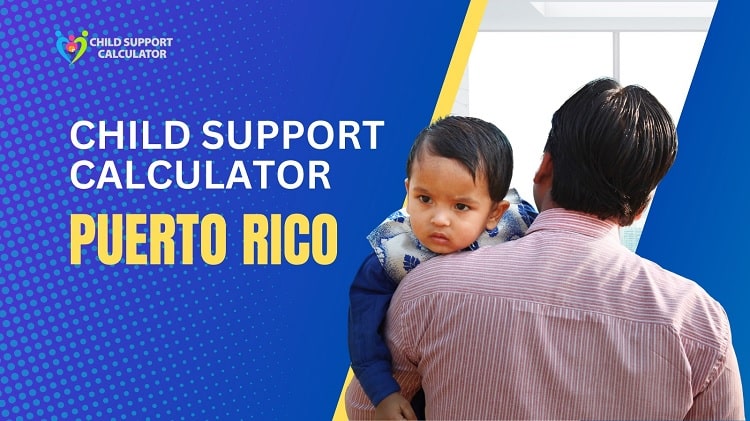Puerto Rico Child Support Calculator | Guidelines – 2024
The Organic Law of the Administration for Child Support, also known as ASUME, is the name of Puerto Rico’s main child support statute.

According to this law, it is a fundamental goal of the Free Associated State and Commonwealth of Puerto Rico to guarantee children’s welfare by requiring parents or guardians to meet their basic needs, including food, shelter, education, and clothing. In this article, we have explained to you about the child support calculator in Puerto Rico.
What is child support in Puerto Rico?
In Puerto Rico, the term “child support” refers to the monetary support given by one or both parents to ensure their children’s welfare and proper upbringing. It is a duty mandated by law to provide for a child’s basic requirements, such as food, shelter, education, and clothing, among others.
The Organic Law of the Administration for Child Support, popularly known as ASUME, is the cornerstone of support in Puerto Rico. The well-being of children will be given priority under this statute in the Free Associated State and Commonwealth of Puerto Rico.
It makes parents or legal guardians legally liable for providing for their children’s fundamental requirements and making sure they have the care and resources they require.
In Puerto Rico, support orders are normally decided by a court process that takes into account things like the parents’ salaries, the kid’s requirements, and the arrangement for child custody. ASUME is crucial in making these arrangements possible and ensuring that kids get the financial assistance they need for a happy and secure childhood.
The ultimate goal of support in Puerto Rico is to ensure that children’s basic needs are addressed so that they can flourish and develop, especially in situations where their parents are divorcing or separated.
How much is child support In Puerto Rico?
The number of children involved, the parents’ salaries, and the kid’s unique needs all affect how much child support is ordered in Puerto Rico.
In Puerto Rico, the amount that a non-custodial parent (the parent who does not live with the kid) is expected to pay is determined by formula and by following child support rules. These regulations take into account the parental income, the cost of the child’s health insurance, and any other unique situations.
The goal of the child support calculator in Puerto Rico is to guarantee that the child receives enough money to meet all of their essential requirements, such as clothing, food, shelter, and education.
It is crucial to remember that child support payments might be changed if circumstances arise, such as a significant shift in the kid’s demands or the parent’s income.
The Organic Law of the Administration for Child Support (ASUME) in Puerto Rico also has a significant impact on how child support issues are managed, including enforcement and collection. ASUME monitors compliance with court-ordered support payments and offers tools and services to help parents determine child support.
As individual circumstances and court rulings might differ greatly, it is advised to get advice from a family law expert or contact ASUME in order to ascertain the precise amount of child support in a given case.
How to calculate child support in Puerto Rico?
In Puerto Rico, calculating child support entails applying a formula that considers a variety of variables, including the combined income of the parents, the number of kids, and particular costs associated with the child’s requirements.
It is crucial to adhere to the rules and legal processes set forth by Puerto Rico’s Organic Law of the Administration for Child Support (ASUME). We’ll outline the procedures for calculating child support below:
Compile financial data
- Start by getting the parents’ financial information. This comprises all forms of income, including salary, self-employment income, rental income, and any other earnings.
- Whatever government benefits or support either parent receives should also be considered when calculating the amount.
Establish Gross Income
- Determine the parent’s combined gross income. Before any deductions or taxes, all sources of income are included.
- The child support rules in Puerto Rico take into account both parents’ gross income to provide a fair assessment.
Take Legal Deductions
- Subtract permitted deductions from the gross income of each parent. Federal and state income taxes, Social Security, Medicare, and required retirement payments are examples of typical allowable deductions.
- Actual, not anticipated amounts, should be used to determine deductions. Providing correct documentation is crucial.
Determine the total net income
- Calculate the net income for each parent after deducting the appropriate deductions.
- To determine the combined net income, add the net earnings of both parents.
Calculate the Minimum Support Obligation
- To determine the minimum amount of child support due based on the total net income and the number of children, consult the Puerto Rico child support guidelines or use the ASUME child support calculator.
- The rules include a standardized table that details the amount of child support based on the number of children and the parent’s income.
Distribute the Child Support Liability
- Calculate each parent’s proportionate share of the total net income to determine their respective share of the basic child support obligation.
- For instance, if one parent makes 60% of the household’s total net income, they are liable for 60% of the required minimum child support.
Take into account additional costs
- Additional costs, including health insurance, nursery, and expensive medical bills, may also be included in child support.
- The parent who does not have primary physical custody may be expected to contribute to these costs in proportion to their income.
Determine the total amount of child support due
- Add the non-custodial parent’s portion for additional costs (such as health insurance child care) to their share of the basic child support obligation.
- This amount is the entire amount of child support due from the non-custodial parent.
Take Custody Arrangements into Account
- The support computation may be changed to reflect the time the kid spends with each parent if the custody agreement calls for shared or joint custody.
- In shared custody cases, the non-custodial parent’s support obligation is often reduced.
Examining and Recording
- It’s crucial to thoroughly examine and record all financial computations and facts.
- The final child support payment and the breakdown of expenses should be understood by both parents.
File an ASUME or court document
- After determining the required child support amount, send the supporting evidence to ASUME or the relevant court.
- ASUME can assist with the enforcement and collection of child support payments.
Watch and Update as Necessary
- If circumstances change, child support orders may need to be amended. This can involve adjustments to the child’s needs, custody agreements, or income.
- Regularly review and, if required, modify child support orders through ASUME or the court.
It’s important to remember that support computations might change depending on a person’s unique situation, and the procedures above provide you with a general idea of how it works in Puerto Rico.
In order to accurately and successfully navigate the child support calculation process, it might be quite advantageous to consult with a family law attorney or make use of ASUME’s resources and services.
ASUME can also help with the enforcement of child support orders and making sure that kids get the money they need for their well-being.
What are special or extraordinary expenses in Puerto Rico?
Special or extraordinary expenses also referred to as “gastos especiales” in Spanish, are extra financial obligations that may be included in a child support order in Puerto Rico in addition to the standard child support requirement.
These costs are often incurred on behalf of the child and are thought to be crucial to their well-being and growth. Special costs can differ but frequently include:
Healthcare expenses
These could include co-pays, deductibles, or expensive treatments for eye, dental, or medical conditions that are not covered by insurance.
Child Care expenditures
Where both parents agree or where they are required in order for the custodial parent to be able to work or go to school, child care expenditures, such as those associated with daycare or after-school programs, can be considered special expenses.
Educational Costs
Costs associated with a child’s education, such as tuition, textbooks, and tutoring, may be regarded as special expenses, particularly if they go above and beyond the typical costs paid by the base support amount.
Extracurricular Activities
Fees for extracurricular activities like sports, music classes, or summer camps might be regarded as special expenses if they help the child’s growth and well-being.
Travel and visitation expenses
Travel costs connected with joint custody or visitation arrangements may be regarded as special expenses if the child’s parents reside in different cities.
Unusual Medical Costs
These costs may include expensive medical procedures or therapies that the child requires for their well-being but which are not covered by insurance.
It’s crucial to remember that deciding which expenses qualify as special or unusual can rely on the particulars of each case and may be decided by negotiation or a judge’s ruling.
These costs are often split between the parents in accordance with their different salaries, with the non-custodial parent paying their share in addition to the required minimum child support.
For accurate calculations and dispute resolution, it is essential that all associated costs and agreements be clearly documented.
Modification of child support in Puerto Rico
When there are significant changes in circumstances that have an impact on either parent’s capacity to make payments or the needs of the child, child support orders may be changed in Puerto Rico. Either parent may ask for modifications, and the procedure usually consists of the following steps:
Initial Petition for Modification
The parent requesting the modification must submit a formal petition to the court or, if they already have an active case with ASUME (the Administration for Child Support), go through them.
The petition must give specific justifications for the sought adjustment and include proof of those justifications.
Change in Situation
Common justifications for requesting a revision include material changes in income, adjustments to custody arrangements, unforeseen medical demands, or changes in the needs of the kid. It is crucial to show that the change is significant and long-lasting.
Notification of the Additional Parent
The other parent will be informed of the request for adjustment and given the chance to comment. Financial evidence should be presented by both parents to back up their claims.
Mediation
To overcome disagreements and come to an understanding of the conditions of the modification, mediation may occasionally be necessary. ASUME can facilitate mediation, or it can be handled by a professional mediator.
Court Hearing
A court hearing can be planned if mediation is unsuccessful and the parents are unable to reach a consensus on the adjustment. Both parents will present their cases during the hearing, and the judge will reach a decision based on the evidence.
Court’s Order
A new support order with the revised provisions will be issued if the court grants the adjustment. The revised child support obligation will be specified in the updated order, along with any adjustments to the standard child support amount and any additional costs.
Enforcement
Both parents are required to follow the modified child support order. ASUME can assist in enforcing the revised order and guaranteeing timely payment.
Keeping precise financial records and proof of any changes in circumstances is essential for parents who want to modify child support payments.
Additionally, seeking legal advice from a family law expert can be quite helpful when navigating the modification procedure.
Keep in mind that support modifications are frequently prospective, which means that any adjustments will take effect as of the date of the modification request and won’t affect past support obligations retroactively.
Conclusion
In conclusion, Puerto Rico has a structured system for determining child support that takes into account the kid’s needs, custody agreements, and income determined through child support calculator in Puerto Rico.
Utilizing standards and instruments, like those made available by ASUME, guarantees a uniform and fair process. When circumstances alter, modifications may be made while putting the child’s welfare first.
faqs
Is child support enforced in Puerto Rico?
A child support order may be implemented in Puerto Rico even if a parent resides in another U.S. state or territory since child support enforcement in the territory is regarded seriously. Your wages could be withheld, or you could be found in contempt of court if you don’t pay your PR child support obligation in the right amount and on time.
What is the Puerto Rican law on child support?
In Puerto Rico, child support is determined by the needs of the parents and the ability of the parties to pay. The money is normally provided to the parent who has physical custody for the benefit of the kids.
How are child support amounts determined in Puerto Rico?
In Puerto Rico, the income shares-only approach is used to determine child support payments. The amount of support is determined by the parents’ combined income and the number of qualifying children. Greater payments are often associated with more children or a greater combined income.







